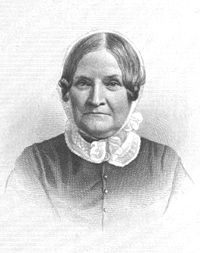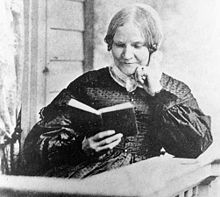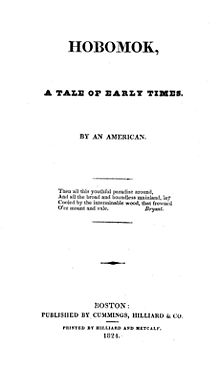- Lydia Maria Child
-


Lydia Maria Child (February 11, 1802 – October 20, 1880) was an American abolitionist, women's rights activist, opponent of American expansionism, Indian rights activist, novelist, and journalist and Unitarian.
Her journals, fiction and domestic manuals reached wide audiences from the 1820s through the 1850s. She at times shocked her audience, as she tried to take on issues of both male dominance and white supremacy in some of her stories.
Despite these challenges, Child was later most remembered for her poem, Over the River and Through the Woods about Thanksgiving. (Her grandfather's house, restored by Tufts University in 1976, still stands near the Mystic River on South Street in Medford, Massachusetts.)
The World War II Liberty Ship Lydia M Child was launched on January 31st, 1943.
Contents
Early life
She was born in Medford, Massachusetts, to Susannah Rand Francis and Convers Francis. Her older brother, Convers Francis, became a Unitarian minister. Child received her education at a local dame school and later at a women's seminary. Upon the death of her mother, she went to live with her older sister in Maine where she studied to be a teacher. During this time, her brother, Convers, a Unitarian minister, who had been educated at Harvard College and Seminary, saw to his younger sister’s education in literary masters such as Homer and Milton. She chanced to read an article in the North American Review discussing the field offered to the novelist by early New England history. Although she had never thought of becoming an author, she immediately wrote the first chapter of a novel entitled Hobomok. Encouraged by her brother's commendation, she finished it in six weeks, and published it. From this time until her death she wrote continually. She taught for one year in a seminary in Medford, and in 1824 started a private school in Watertown. In 1826, she began the publication of the Juvenile Miscellany, the first monthly periodical for children issued in the United States, and supervised it for eight years.[1]
Marriage and family
Lydia Child taught school until 1828, when she married Boston lawyer David Lee Child.[2] His political activism and involvement in reform introduced her to the social reforms of Indian rights and Garrisonian abolitionism.
She was a long-time friend of activist Margaret Fuller and frequent participant in Fuller's "conversations" held at Elizabeth Palmer Peabody's North Street bookstore in Boston.
Another friend, Harriet Winslow Sewall, arranged Child's letters for publication after her death.
Abolitionism and Women's Rights Movements
Lydia Child and her husband began to identify themselves with the anti-slavery cause in 1831 through the personal influence and writings of William Lloyd Garrison.[1] Child was a women's rights activist, but did not believe significant progress for women could be made until after the abolition of slavery. She believed that white women and slaves were similar in that white men held both groups in subjugation and treated them as property instead of individual human beings. Despite the fact that she worked towards equality for women, Child made her opinion known that she did not care for all-female societies. She believed that women would be able to achieve more by working alongside men. Child, along with many other female abolitionists, began campaigning for equal female membership in the American Anti-Slavery Society, a controversy which later split the movement.
In 1833 her book An Appeal in Favor of That Class of Americans Called Africans was published. It argued in favor of the immediate emancipation of the slaves without compensation to slaveholders, and she is sometimes said to have been the first white person to have written a book in support of this policy. She "surveyed slavery from a variety of angles - historical, political, economic, legal, and moral" to show that "emancipation was practicable and that Africans were intellectually equal to Europeans."[3] The book was the first anti-slavery work printed in America in book form, and she followed it up with several smaller works on the same subject. Her Appeal attracted much attention, and William Ellery Channing, who attributed to it part of his interest in the slavery question, walked from Boston to Roxbury to thank Mrs. Child for the book. She had to endure social ostracism, but from this time was a conspicuous champion of anti-slavery.[1]
Child, a strong supporter and organizer in anti-slavery societies, helped with fundraising efforts to finance the first anti-slavery fair, which abolitionists held in Boston in 1834. In 1839, she was elected to the executive committee of the American Anti-Slavery Society, and became editor of the society's National Anti-Slavery Standard in 1840. She edited the Standard until 1843, when her husband took her place as editor-in-chief, and she acted as his assistant, until May 1844. During her stay in New York, Lydia was an inmate of the family of Isaac T. Hopper, a Quaker philanthropist. After leaving New York, the Childs settled in Wayland, Massachusetts, where they spent the rest of their life.[1]
Child also served as a member of the American Anti-Slavery Society’s executive board alongside Lucretia Mott and Maria Weston Chapman during the 1840s and 1850s. She also wrote short stories exploring through fiction the complex issues of slavery. Examples include "The Quadroons" (1842) and "Slavery's Pleasant Homes: A Faithful Sketch" (1843). She wrote anti-slavery fiction to reach people beyond what she could do in tracts. She also used it to address issues of sexual exploitation which affected both the enslaved and the slaveholder family. In both cases she found women suffered from the power of men. The more closely Child addressed some of the abuses, the more negative reaction she received from her readers. Too much reality was more than they could bear.[3]
In the end, however, Child made the decision to leave the paper because she refused to promote violence as an acceptable weapon for battling slavery. The abolitionists’ inability to work together as a cohesive unit angered Child. The constant bickering amongst them caused a permanent estrangement which forever separated Child from the AASS. In quotes, Child stated that she believed herself to be "finished with the cause forever." She did continue to write for many newspapers and periodicals during the 1840s, and she promoted greater equality for women. However, because of her negative experience with the AASS, she never fought again outright for women’s rights or suffrage movements in organized movements or societies.
In the 1850s Child responded to the Senate beating of her good friend Charles Sumner by writing her poem entitled “The Kansas Emigrants.” The outbreak of violence in Kansas brought about a certain change in Child’s opinion of the use of violence. Along with Angelina Grimke, another proponent for peace, she acknowledged the need for the use of violence to protect antislavery emigrants in Kansas. Child also sympathized with the radical abolitionist John Brown. While she did not condone his zealous violence, she deeply admired his courage and conviction and even wrote to Virginia Governor Henry A. Wise offering her services at Brown’s sickbed. In 1861, Child helped Harriet Ann Jacobs with her Incidents in the Life of a Slave Girl.
Indians' Rights work
Child's first novel, the historical romance Hobomok: A Tale of Early Times, was published anonymously under the gender-neutral pseudonym "an American." The plot centers on the interracial marriage between a white woman and a Native American man, with whom she bore a son. The heroine later remarries, reintegrating herself and her child into Puritan society. The issue of miscegenation caused a scandal in the literary community and the book was not a critical success.[4]
During the 1860s, Child wrote pamphlets on Indian rights. The most prominent, An Appeal for the Indians (1868), called upon government officials, as well as religious leaders, to bring justice to American Indians. Her presentation sparked Peter Cooper's interest in Indian issues, and led to the founding of the US Board of Indian Commissioners and the subsequent Peace Policy in the administration of Ulysses S. Grant.
Child died in Wayland, Massachusetts, aged 78, on October 20, 1880, at her home at 91 Old Sudbury Road. She was buried at North Cemetery in Wayland.[5]
Publications
- Hobomok: A Tale of Early Times (1824). Google books
- The Rebels, or Boston before the Revolution (1825). 1850 ed., Google books
- Juvenile Miscellany, a children's periodical (editor, 1826–1834)
- The First Settlers of New England (1828)
- The Indian Wife (1828)
- The American Frugal Housewife, a book of kitchen, economy and directions (1829; 33rd edition 1855)
- The Mother's Book, an early American instructional book on child rearing, republished in England and Germany (1831)
- Coronal, a collection of verses (1931)
- The Ladies' Family Library, a series of biographies (5 vols., 1832–1835)
- The Girl's Own Book (1833)
- The Girl's Own Book; new ed. by Mrs. R. Vallentine. London: Wiliam Tegg, 1863
- An Appeal in Favor of that Class of Americans Called Africans (1833)
- The Oasis (1834)
- Philothea, a romance of Greece in the days of Pericles (1836)
- The Family Nurse (1837)
- The Liberty Bell, included stories such as "The Quadroons" (1842)
- "Slavery's Pleasant Homes: A Faithful Sketch", a short story (1843)
- Letters from New York, written to the Boston Courier (2 vols., 1843–1845)
- A Boy's Thanksgiving Day, a Thanksgiving favorite (1844)
- Flowers for Children (3 vols., 1844–1846)
- Fact and Fiction (1846)
- Rose Marian and the Flower Fairies (1850)
- The Power of Kindness (Philadelphia, 1851)
- The Progress of Religious Ideas through Successive Ages, an ambitious work, showing great diligence, but containing much that is inaccurate (3 vols., New York, 1855)
- Isaac T. Hopper: A True Life (1853)
- Autumnal Leaves (1857)
- Looking Toward Sunset (1864)
- The Freedmen's Book (1865)
- Miria, a romance of the Republic (1867)
- An appeal for the Indians (1868)
- Aspirations of the World (1878)
- A volume of her letters, with an introduction by John G. Whittier and an appendix by Wendell Phillips, was published after her death (Boston, 1882)
See also
- Over the River…Life of Lydia Maria Child, Abolitionist for Freedom. (2008) Documentary, narrated by Diahann Carroll.
- Edward Strutt Abdy
References
- ^ a b c d
 "Child, David Lee". Appletons' Cyclopædia of American Biography. 1900.
"Child, David Lee". Appletons' Cyclopædia of American Biography. 1900. - ^
 Chisholm, Hugh, ed (1911). "Child, Lydia Marie". Encyclopædia Britannica (11th ed.). Cambridge University Press.
Chisholm, Hugh, ed (1911). "Child, Lydia Marie". Encyclopædia Britannica (11th ed.). Cambridge University Press. - ^ a b Samuels, Shirley. The Culture of Sentiment: Race, Gender and Sentimentality in Nineteenth-Century America. New York: Oxford UP, 1992: 64-70.
- ^ Samuels, Shirley. The Culture of Sentiment: Race, Gender and Sentimentality in Nineteenth-Century America. New York: Oxford UP, 1992: 59.
- ^ Ehrlich, Eugene and Gorton Carruth. The Oxford Illustrated Literary Guide to the United States. New York: Oxford University Press, 1982: 63. ISBN 0-19-503186-5
- Baer, Helene Gilbert The Heart is Like Heaven: the life of Lydia Maria Child, 339 pages, University of Pennsylvania Press, 1964.
- Karcher, Carolyn L. The First Woman in the Republic: A Cultural Biography of Lydia Maria Child. Durham: Duke UP, 1994.
- Harrold, Stanley. American Abolitionists. Essex, England: Pearson Education Limited, 2001.
- Salerno, Beth A. Sister Societies: Women’s Antislavery Societies in Antebellum America. DeKalb, Illinois: Northern Illinois University Press, 2005.
- Teets- Parzynski, Catherine. “Child, Lydia Maria Francis.” American National Biography Online. http://www.anb.org/articles/15/15-00127.html.
- "Child, Lydia Maria (Francis)" American Authors 1600–1900. H. W. Wilson Company, NY 1938.
- WorldCat Accessed March 14, 2008
- Amazon.com Accessed March 14, 2008
- "A Boy's Thanksgiving Day." Women's History: Poems by Women. Jone Johnson Lewis, editor. URL: http://womenshistory.about.com/od/thanksgiving/a/child_thanks.htm?p=1 Accessed March 14, 2008
External links
- Dictionary of Unitarian & Universalist:Lydia Maria Child
- UVA: Etexts for Lydia Child
- Biography from Spartacus Educational
- UVA: Freedman's Book
- Page images and transcript of The Frugal Housewife, Dedicated to Those Who Are Not Ashamed of Economy
- Biography at Feeding America: The Historic American Cookbook Project
- The Mother's Book
- Works by Lydia Child at Project Gutenberg
- Biography from American National Biography
- selection of writings by Lydia which were in The Liberty Bell, an abolitionist gift book, at the website of Bucknell University, edited by Glynis Carr
- Lydia Maria Francis Child Correspondence.Schlesinger Library, Radcliffe Institute, Harvard University.
- Letters of Lydia Maria Child, arranged by Harriet Winslow Sewall, from the Internet Archive
Categories:- 1802 births
- 1880 deaths
- American abolitionists
- American novelists
- American women's rights activists
- Native Americans' rights activists
- People from Medford, Massachusetts
- American Unitarians
- Female authors who wrote under male or gender-neutral pseudonyms
Wikimedia Foundation. 2010.


